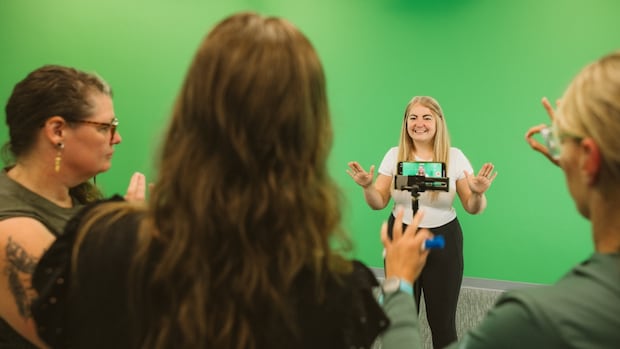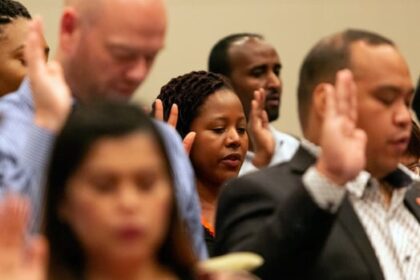Nova ScotiaInformation Morning spoke with the program manager for the Nova Scotia Community College’s deaf interpreting program and a student. We have provided a transcript of this interview for those with hearing loss.A deaf interpreter can receive ASL English but more clearly with cultural conceptsCBC News · Posted: Sep 08, 2025 5:40 AM EDT | Last Updated: 3 hours agoStudents in the deaf interpreting program at the Nova Scotia Community College’s Ivany Campus. (Nova Scotia Community College)The following is a transcript of an interview that aired on Information Morning on Sept. 8. This interview has been edited for clarity.HOST: An American Sign Language or ASL interpreter can translate between spoken word and ASL for deaf people and those with hearing loss, but a new program at the Nova Scotia Community College — the first of its kind in Canada — is teaching deaf students to become deaf interpreters. Students from across the country came to the Ivany Campus on the Dartmouth waterfront for three weeks and now their course will continue online. The CBC’s Jessie Bruce went to the campus to find out more. Bruce spoke to Beverly Buchanan, the program manager for the deaf interpreting program at NSCC, and Craig Cannon, who is a student.Beverly: Hi, I’m Beverly Buchanan and I’m the program manager at Nova Scotia Community College for the ASL studies program, ASL English interpretation program, and now the deaf interpreting program.Craig: My name is Craig Cannon, I’m a deaf interpreting student here at NSCC Ivany Campus.Beverly: So an ASL interpreter or ASL English interpreter would receive ASL English and then interpret it into English or ASL. And a deaf interpreter can do that, but more clearly with the content. They often work with a hearing interpreter. Sometimes a hearing interpreter doesn’t have enough time to go in depth on certain cultural concepts in a way that a deaf interpreter can. A deaf person can do that expansion and clarification in their natural language with the deaf community.Jessie: And what are some of the unique benefits that a deaf interpreter brings to a situation that an ASL interpreter might not?Beverly: There is a lot of newcomers to Canada, a lot of immigrants. They don’t have the same language backgrounds. So some people are coming with gestural language, with facial expression [and] facial grammar that’s different. There’s a different level of language access that [deaf interpreting] can provide to newcomers or to immigrants who are coming from different cultural contexts into Nova Scotia. Also with children who might not have had the same educational opportunities, who don’t have the same language comprehension in English. You’ve also seen deaf interpreters looking for emergency announcements. Deaf interpreters also work in platform settings, in those situations where there’s a large and varied deaf audience or a mix of a deaf and hearing audience. Deaf interpreters add a depth of cultural nuance that comes from lived experience and growing up in the language. Jessie: So what sparked the idea for bringing this program here to NSCC? Beverly: I joined NSCC in 2023, September of 2023, and before I got here the team who was already here was starting to work on the ground for something. We needed something. Deaf interpreting was becoming very popular in the world, was getting a little bit more recognition. So we went ahead and applied for the grant. We were given the funding and we wanted to see how we could recruit for this program, which is the first in Canada. It became very big. They had three weeks of in-person, intensive courses this summer. I stayed in the housing with them. We provided everything that they needed, including all of the dishes and silverware and everything so that they could live in housing for three weeks. They learned a specific, targeted course about digital media. The next week was about an introduction to deaf interpreting and history, and then the third week was the beginning of an introduction into interpreting competencies.Craig: So the first week was my favourite week because I have an IT background so I’m pretty familiar with what we’re doing and I had to actually support some of the students during their project. So that made me pretty popular in the class. In the other two weeks they had to support me with the history and deaf culture and whatnot because I had a lack of that so it was a nice trade-off in supporting each other with where we lack. I grew up mainstreamed deaf person in a hearing school, so I didn’t get much exposure to deaf culture and language. So the [deaf interpreting] program really much fast-tracked that experience for me.The founding class of the deaf interpreting program at NSCC with program faculty Zoh Qureshi, front left, and Beverly Buchanan, front right, manager, ASL and ASL English interpretation programming. (Nova Scotia Community College)Jessie: Do you think now you’ll be able to maybe provide that interpreter skill for people who were in your situation growing up?Craig: Yes, because I can look back on my experience, see what I missed and what could I fill in that gap with to support this generation of deaf needs.Beverly: The classes that we had for three weeks, to see the students’ eyes just fill with passion and with knowledge that they were quite obviously missing in the past and to just see them access that education very, very quickly. The primary reason for that being a deaf teacher teaching in sign language to a deaf audience. We had 15 students plus instructors who could all communicate with each other. No need for interpreters or any external communication. We had people from B.C., Alberta, Saskatchewan, Ontario, Quebec, Newfoundland and Nova Scotia and New Brunswick and I’m still getting emails from people worldwide who are interested in joining this program. For now, it’s open to Canadian students only, but in the future we’re hoping to do an open international offering and see what we can do with it. Jessie: What does it feel like to be on the cutting edge here in Canada? Beverly: Incredibly honoured for one thing, and I do think we could be a model to others who are looking to do this kind of work. I think that it’s important to provide deaf people with the skills and opportunity for professional employment in the community, especially thinking about access and the lack of access.Jessie: What was creating the curriculum like?Beverly: We gathered all of this data, we got a lot of advice. We did borrow some from the hearing interpreting concepts and also deaf interpreting concepts. And we have eight instructors who all took a look at the curriculum and helped us to organize and map all of the courses and had lots of meetings and made sure everything was going smoothly. And a few aha moments here and there. Some things might need to move to the beginning next time. That sort of thing as expected.Craig: I hope to find many opportunities … Different jobs are available across Canada and [I want to try] out new experiences being in different settings [like] hospitals, courts, different platforms with these skill sets.Beverly: I noticed also with the 15 students that we have now, they are looking forward to being more advocates in their community. For an example, this is a radio interview and deaf people can’t access it. So there is some information that’s just missing in the deaf community, and I know that our students are eager to provide and be the link to some of that, especially because miscommunications can cause things to go awry very, very quickly. So as deaf interpreters, knowing what’s going on in the world, doing the appropriate research, finding the appropriate background and context before going into interpreting situations. Jessie: What inspired you to take on the role of becoming a deaf interpreter?Craig: My experience growing up — I was mainstream, so I was quite isolated. I did join the deaf community later in life and I did receive much support from that deaf community. So I want to give back, you know, be a deaf mentor for young deaf people to show them that a better future is possible.Beverly: The deaf world is a very visual world and we are trying to grow that world knowledge with this program. The main point here is the lack of communication access that the deaf community hasn’t had, so we’re just trying to increase that. And this deaf interpreting program is a little bit of a part of that.HOST: Beverly Buchanan is the program manager for the deaf interpreting program at NSCC and Craig Cannon is a student. They were both speaking with Information Morning’s Jessie Bruce. MORE TOP STORIES
NSCC program teaches deaf students to become deaf interpreters











